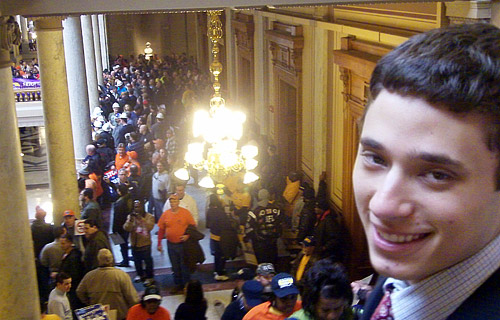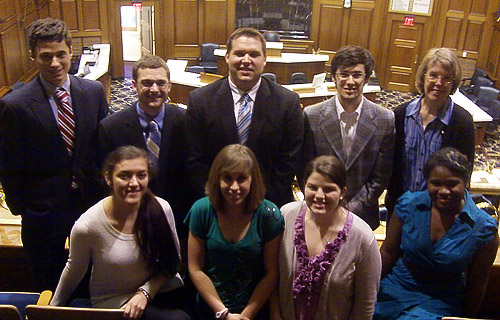Waiting Game
March 4, 2011

Members of the DePauw Environmental Policy Project (DEPP) have become familiar faces at the Indiana General Assembly. Since 2009 the group has presented its findings on issues such as geothermal heating and industrial farming before House and Senate committees, shaping policy and the future of the state. But no amount of research, no matter how persuasive, makes a difference without a vote.
Rumors of a walkout by House Democrats spread through the capitol on the morning of Feb. 22. The Democrats opposed a collection of education and budgetary measures, but without the numbers to stop them on the floor, it seemed likely that they would turn to other options. Later that day, House Speaker Brian Bosma erased any doubts when he observed out loud that several cars were missing from the parking lot.
The missing Democrats turned up in Illinois – whose Democratic governor was unlikely to intervene – and have remained out of state since. The bloc is large enough to keep the Indiana House just short of its requirement of 67 present representatives needed to conduct business.
As the quorum-less days in Indianapolis continue, DEPP can do little but watch as events unfold. Many of the bills they had planned testimony for have already moved out of the Senate and are now stuck in limbo in the House.
But not all is quiet in the capitol. Chanting and singing protesters have gathered there in what has become a familiar scene throughout the Midwest. DEPP members say the atmosphere has been charged, but upbeat.
“I thought it might be intimidating, but it isn’t at all,” says senior Sally M. Reasoner. “It’s a nice crowd. Although they are protesting these bills, they are also there in support of the Democrats, and that tone overwhelms.”
“We’ve heard allegations of name-calling and even spitting, but we personally have never witnessed any of that,” says junior Mathew W. Cecil, DEPP’s media director. “Media outlets have portrayed both the legislators and protesters as people who aren’t like the ‘normal Hoosier,’ but they are very much members of the same state.”

Many DEPP members are using the legislative lull to strengthen their research for when the House reconvenes. Reasoner, however, plans to interview all 19 freshman representatives – mostly Republicans – as part of her senior thesis on impact of the Tea Party on Indiana politics.
“They’re new and enthusiastic about being there, and maybe less political than party leadership would be,” she says.” I think that they are open to talk, and they have an interesting perspective.”
The recent majority flip in the General Assembly changed the types of bills that DEPP expected to be brought up, but not its work in general. As a nonpartisan group, their purpose is to present factual research that cuts through partisan rhetoric.
Recently, members such as senior Sheah N. Hilton have worked with legislators from both sides of the aisle. Hilton is hoping to improve regulations on the many tons of manure produced by concentrated feeding operations (CFOs), impacting the health of residents of counties in eastern Indiana.
On other issues, Reasoner believes that political maneuvering can override even the most engaging testimony.
“It’s the reality of the situation,” Reasoner says. “The next election is never far away.”
The standoff in the House could last until the General Assembly adjourns in late April, effectively blocking any legislation from a vote during the session. If it becomes their only option, DEPP members are considering traveling to state legislatures in Ohio and Kentucky for testimony on similar bills.
“We’re not frustrated yet,” Cecil says. “If the standoff went on for a month, then maybe it becomes a roadblock to our program because we can’t provide what we believe is very important research.”
“DEPP produces original, substantive information,” Reasoner adds. “It might not affect Indiana’s legislation, but somebody in another state can use it.”
